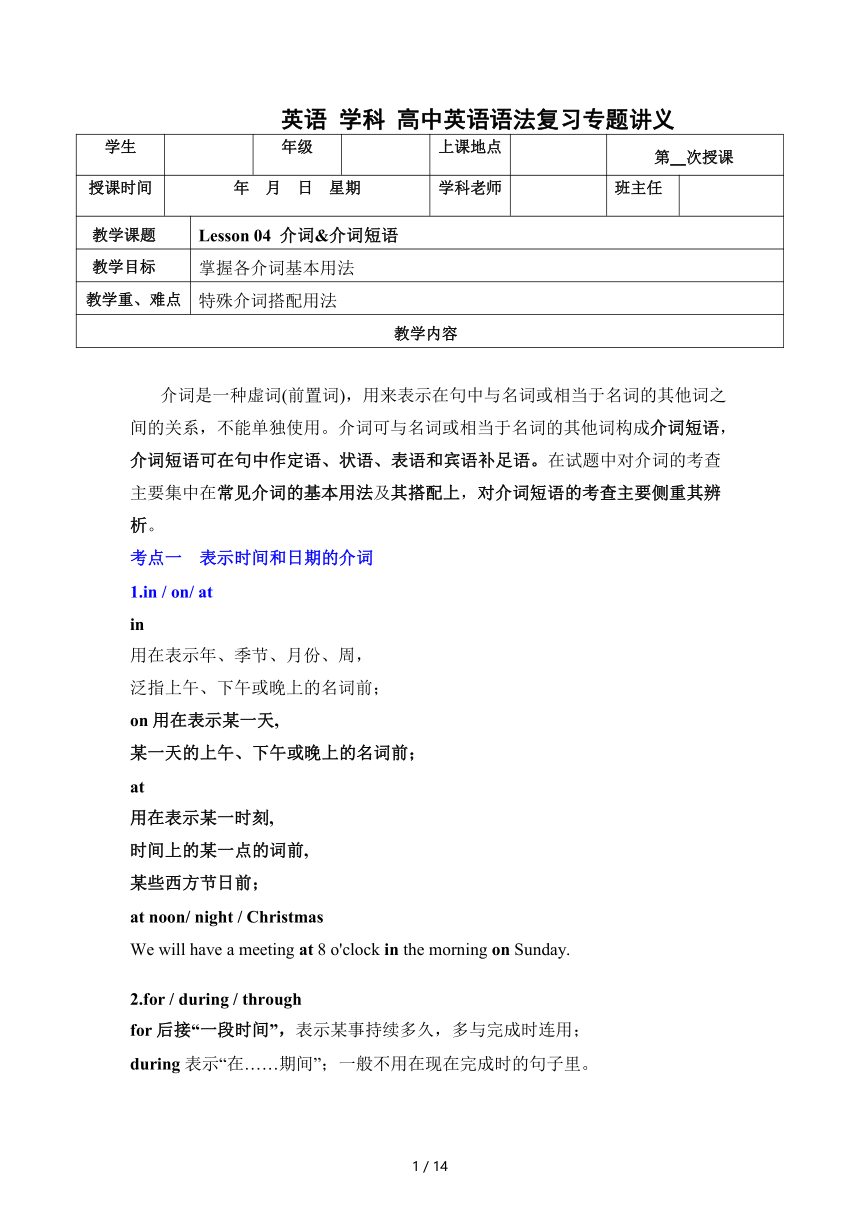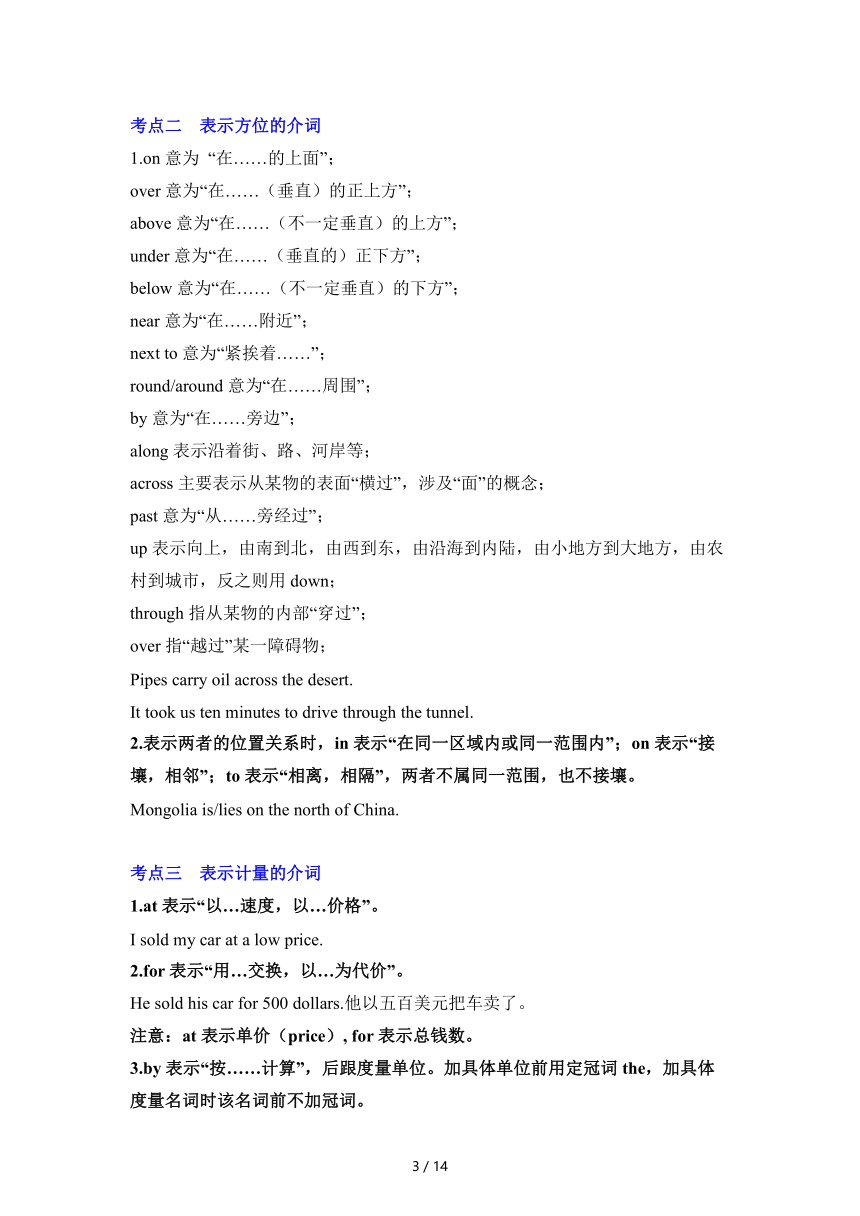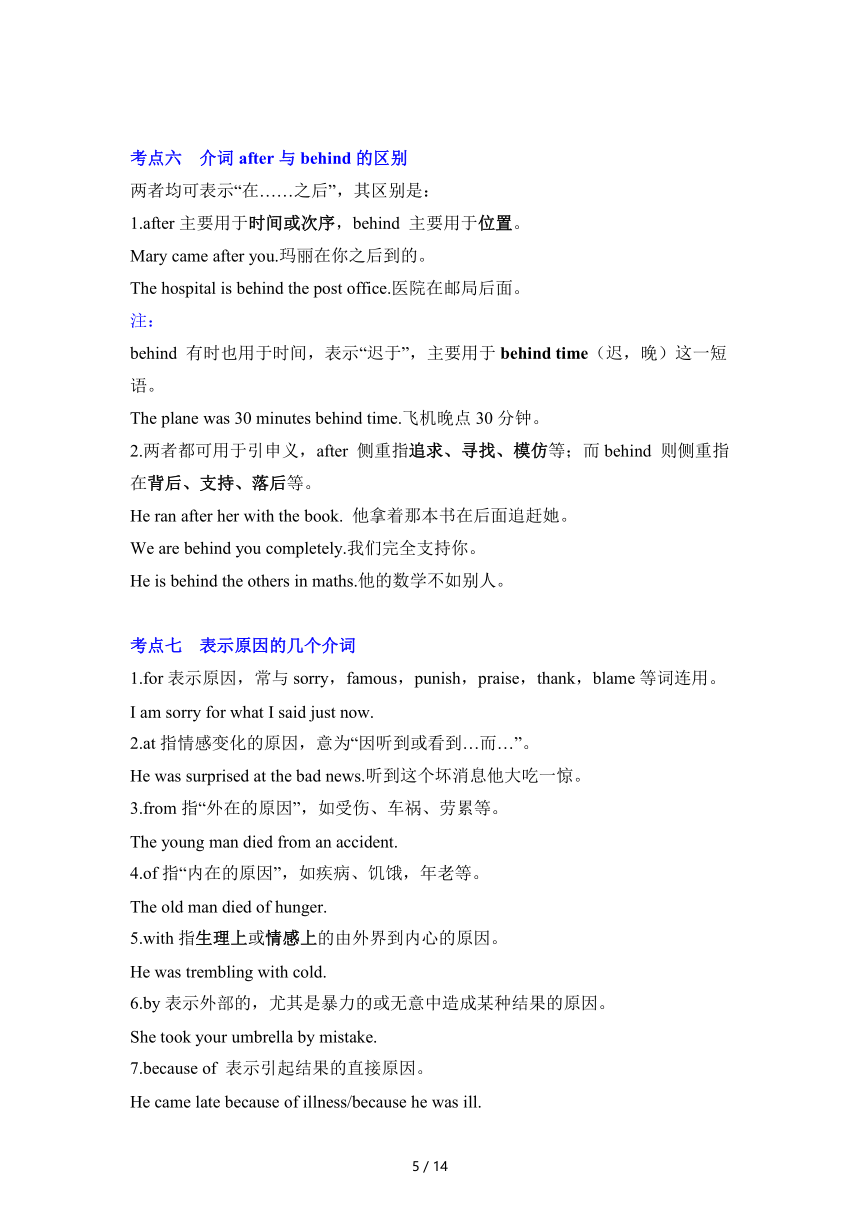2022届高考英语二轮复习:介词&介词短语讲义(素材)
文档属性
| 名称 | 2022届高考英语二轮复习:介词&介词短语讲义(素材) |  | |
| 格式 | docx | ||
| 文件大小 | 47.1KB | ||
| 资源类型 | 教案 | ||
| 版本资源 | 通用版 | ||
| 科目 | 英语 | ||
| 更新时间 | 2022-01-06 16:41:34 | ||
图片预览





文档简介
英语 学科 高中英语语法复习专题讲义
学生 年级 上课地点 第 次授课
授课时间 年 月 日 星期 学科老师 班主任
教学课题 Lesson 04 介词&介词短语
教学目标 掌握各介词基本用法
教学重、难点 特殊介词搭配用法
教学内容
介词是一种虚词(前置词),用来表示在句中与名词或相当于名词的其他词之间的关系,不能单独使用。介词可与名词或相当于名词的其他词构成介词短语,介词短语可在句中作定语、状语、表语和宾语补足语。在试题中对介词的考查主要集中在常见介词的基本用法及其搭配上,对介词短语的考查主要侧重其辨析。
考点一 表示时间和日期的介词
1.in / on/ at
in
用在表示年、季节、月份、周,
泛指上午、下午或晚上的名词前;
on用在表示某一天,
某一天的上午、下午或晚上的名词前;
at
用在表示某一时刻,
时间上的某一点的词前,
某些西方节日前;
at noon/ night / Christmas
We will have a meeting at 8 o'clock in the morning on Sunday.
2.for / during / through
for后接“一段时间”,表示某事持续多久,多与完成时连用;
during表示“在……期间”;一般不用在现在完成时的句子里。
through表示“一直……,自始至终”。
She has been ill for several days.
I went to France during the summer holiday.
They worked hard through the winter.
3.from,since
from表示时间的起点,意为“从…”,多用于“from...to/till...”中;
since表示“自从…以来”。
I have been waiting here from morning till noon.
We have been friends since we first met.
注意:
for和since都常与完成时连用,但for接时间段,since接时间点。如for two hours(持续)两小时;since last week从上周直到现在。
4.before,by,till,until
before指“在……之前”,与after相对。
by指“在……以前,不迟于;到……时为止”,by后接过去时间,常与过去完成时连用;by后接将来时间,常与将来完成时连用。
till(until)“直到……为止”,在肯定句中,till/until必须与延续性动词连用;在否定句中,till/until常与非延续性动词连用。
Please come before ten o'clock.
You must wait for him till tomorrow.
5.after,in
in+一段时间:表示以说话时为起点一段时间之后,与一般将来时连用;但表示“在……之内”时,用于各种时态, 经常用within 来替代。
after+一段时间表示:“在……之后”,用于一般过去时;但时间为点时间时,只能用after, 用于各种时态。
I'll arrive in an hour after 3:00 pm.
考点二 表示方位的介词
1.on意为 “在……的上面”;
over意为“在……(垂直)的正上方”;
above意为“在……(不一定垂直)的上方”;
under意为“在……(垂直的)正下方”;
below意为“在……(不一定垂直)的下方”;
near意为“在……附近”;
next to意为“紧挨着……”;
round/around意为“在……周围”;
by意为“在……旁边”;
along表示沿着街、路、河岸等;
across主要表示从某物的表面“横过”,涉及“面”的概念;
past意为“从……旁经过”;
up表示向上,由南到北,由西到东,由沿海到内陆,由小地方到大地方,由农村到城市,反之则用down;
through指从某物的内部“穿过”;
over指“越过”某一障碍物;
Pipes carry oil across the desert.
It took us ten minutes to drive through the tunnel.
2.表示两者的位置关系时,in表示“在同一区域内或同一范围内”;on表示“接壤,相邻”;to表示“相离,相隔”,两者不属同一范围,也不接壤。
Mongolia is/lies on the north of China.
考点三 表示计量的介词
1.at表示“以…速度,以…价格”。
I sold my car at a low price.
2.for表示“用…交换,以…为代价”。
He sold his car for 500 dollars.他以五百美元把车卖了。
注意:at表示单价(price), for表示总钱数。
3.by表示“按……计算”,后跟度量单位。加具体单位前用定冠词the,加具体度量名词时该名词前不加冠词。
They are paid by the day.
考点四 表示行为的工具、手段或者方式的介词
1.by表示用某种方式,多用于交通。如by bus乘公共汽车,by email通过电子邮件。
注意:
表示搭乘交通工具时,用by时,名词前不加冠词;用in/on时,名词前要加冠词。
I went there by bus/in a car.
2.with表示“用某种具体工具,身体的某部分或是器官”。
We speak with our mouths.
注意:
with表示用某种工具时,名词前必须用冠词或物主代词。
3.in表示用某种材料或语言。
Please speak in English and write in ink.
4.through表示“以(方法、手段),经由”,后面多接抽象名词。
You can only achieve success through hard work.
考点五 表示“除……之外”的介词
besides表示包含,“除…之外还有…”。
except表示排除,“除…之外”,指整体里面排除部分。
but表示排除,多与nobody,none,no one,nothing,anything,everyone,all等连用,其后可以接不定式;
except for表示“除……之外”,常在说明基本情况后,从细节上加以修正。
apart from表示“此外,除……之外”,相当于besides/as well as;表示“撇开……来说,除去”,相当于except for;
in addition to表示“除…之外还有…”,相当于besides。
Apart from going shopping, the old lady likes walking after dinner except when it rains.
Beijing is a beautiful city, except for its traffic. 除了交通之外,北京是一个漂亮的城市。
考点六 介词after与behind的区别
两者均可表示“在……之后”,其区别是:
1.after主要用于时间或次序,behind 主要用于位置。
Mary came after you.玛丽在你之后到的。
The hospital is behind the post office.医院在邮局后面。
注:
behind 有时也用于时间,表示“迟于”,主要用于behind time(迟,晚)这一短语。
The plane was 30 minutes behind time.飞机晚点30分钟。
2.两者都可用于引申义,after 侧重指追求、寻找、模仿等;而behind 则侧重指在背后、支持、落后等。
He ran after her with the book. 他拿着那本书在后面追赶她。
We are behind you completely.我们完全支持你。
He is behind the others in maths.他的数学不如别人。
考点七 表示原因的几个介词
1.for表示原因,常与sorry,famous,punish,praise,thank,blame等词连用。
I am sorry for what I said just now.
2.at指情感变化的原因,意为“因听到或看到…而…”。
He was surprised at the bad news.听到这个坏消息他大吃一惊。
3.from指“外在的原因”,如受伤、车祸、劳累等。
The young man died from an accident.
4.of指“内在的原因”,如疾病、饥饿,年老等。
The old man died of hunger.
5.with指生理上或情感上的由外界到内心的原因。
He was trembling with cold.
6.by表示外部的,尤其是暴力的或无意中造成某种结果的原因。
She took your umbrella by mistake.
7.because of 表示引起结果的直接原因。
He came late because of illness/because he was ill.
8.owing to多表示引起某不良后果的原因。
Owing to the rain,they did not turn up.
9.thanks to表示引起某种幸运结果的原因,意为“幸亏……,多亏……”。
Thanks to John,we won the game.
10.out of表示动机的起因,意为“出于……”。
He asked the question out of curiosity.
考点八 against
1.(表示方向)与…方向相反;逆着;迎着;顶着
against the wind 迎着风;逆着风
2.(表示方位)紧靠着…;倚靠着……
against the wall 靠着墙
3.(表示对象)对…不利;对…有害;以…为竞争对手;违反;违背
fight against同…战斗;
against the natural law违背自然规律
4.(表示对比)和……比;和……对照;以……为背景
against the blue sky 以蓝天为背景
考点九 beyond
1.(表示位置)在〔往〕…另一边;在〔往〕…那一边;在〔往〕……的更远处
The house is beyond the bridge.房子在桥那边。
2.(表示时间)迟于;晚于;在…之后
Don't stay here beyond midnight.待在这里不要超过午夜。
3.(表示范围)超出;非…所能及
The switch on the wall was beyond the baby's reach.墙上的开关小孩子是够不到的。
4.(表示程度)超出…的范围;超过;对…来说太难
The tasks they faced seemed far beyond their ability.
5.(表示数目)多于;超过
There weren't beyond twenty people present.出席的人不超过20个。
考点十 for:
1.表示“当作、作为”.
I like some bread and milk for breakfast.我喜欢把面包和牛奶作为早餐.
What will we have for supper 我们晚餐吃什么
2.表示理由或原因,意为“因为、由于”.
Thank you for helping me with my English.谢谢你帮我学习英语.
Thank you for your last letter.谢谢你上次的来信.
Thank you for teaching us so well.感谢你如此尽心地教我们.
3.表示动作的对象或接受者,意为“给…”、“对… (而言)”.
Let me pick it up for you.让我为你捡起来.
Watching TV too much is bad for your health.看电视太多有害于你的健康.
4.表示时间、距离,意为“计、达”.
I usually do the running for an hour in the morning.我早晨通常跑步一小时.
We will stay there for two days.我们将在那里逗留两天.
5.表示去向、目的,意为“向、往、取、买”等.
Let’s go for a walk.我们出去散步吧.
I came here for my schoolbag.我来这儿取书包.
I paid twenty yuan for the dictionary.我花了20元买这本词典.
6.表示所属关系或用途,意为“为、适于……的”.
It’s time for school.到上学的时间了.
Here is a letter for you.这儿有你的一封信.
7.表示“支持、赞成”.
Are you for this plan or against it 你是支持还是反对这个计划
8.用于一些固定搭配中.
Who are you waiting for 你在等谁
For example,Mr Green is a kind teacher.比如,格林先生是一位心地善良的老师.
考点十一 with
1.表示人与人的协同关系,意为“一起”“和”
make friends with 与....交朋友
talk with sb = talk to sb
2.表示“带有”“拥有”
tea with honey 加蜂蜜的茶
a man with a lot of money 一个有很多钱的人
3.表示“用”某种工具或手段
write with a pencil 用铅笔写字
cut the apple with a knife 用刀切苹果
4...表示“在...身边”“在...身上”
I don’t have any money with me. 我身上没带钱。
Take an umbrella with you in case it rains 带把伞以防下雨。
5.表示“在...之下”
With the help of sb = with one’s help 在某人的帮助下
6.表示“随着”
with the development of ... 随着...的发展 float with the wind 随风飘动
7.常见带有with的动词短语
agree with sb/sth 同意某人或某事 deal with sth = do with sth处理某事
help sb with sth 在...上帮助某人 fall in love with sb/sth爱上某人/某物
get on with sb与某人相处 get on well with sb与某人相处得好
have nothing to do with sb与某人无关 compare A with B将A和B作比较
communicate with sb与某人交流 argue with sb = quarrel with sb与某人吵架
have fun with sth 玩的开心 get away with sth做坏事不受惩罚
chat with sb跟某人闲谈 charge sb with sth 指控某人…
put up with sth忍受
8.常见带with的形容词固定搭配
be satisfied with 对...满意 be content with sth 对...满足
be angry with sb 生某人的气 be strict with sb 对某人严格
be patient with sb 对某人有耐心 be popular with sb 受某人欢迎
be filled with sth 装满... 充满..... = be full of sth What’s wrong/the matter with sb/sth
be familiar with sb/sth 熟悉某人或某物 be connected with sb/sth 与....有关 Be decorated with 被…装饰 be impressed with/by
考点十二 by
by的用法小结
1.用于被动语态的句子中,表示动作的执行者,意为“被;由”。
He was praised by the teacher.他受到了老师的表扬。
the book was written by Lu Xun.这本书是鲁迅写的。
2.表示方式、方法、手段等,后常接无冠词的名词或动名词,意为“通过;靠;用”。
Don't judge a person by appearances. 勿以貌取人。
He made a living by teaching.他以教书为生。
3.表示时间,意为“到……时(为止”或“不迟于……”。
He ought to be here by now.他现在应该在这儿了。
By the time he was ten, he had learnt about 1,000 English words.到十岁时,他已学了约一千个英语单词。
4.表示(增减)程度,尺寸数量等,意为“至……的程度”。
the bullet missed me by two inches.那子弹以两英寸之差未击中我。
the rope needs to be longer by two feet.这绳子需要再长两英尺。
5.表示交通路线或工具,后接名词不用冠词,意为“乘;坐”。
go by bus / plane / train 乘汽车(飞机、火车)去
travel by land / sea / air 陆上(海上、空中)旅行
6.表示位置,意为“在近旁;在……旁边”。
There is a pumping station by the river.河边有个抽水站。
考点十三 off
副词 ad.
1.(离)开,(走)开,(隔)开
They went off together and left me sitting there.他们一同离开了,留下我独自坐在那里.
2.(时间、空间上)离,距
The town is five miles off.小城离这儿五英里远.
3.切断,关掉,停止;取消;不在工作,休息
He turned off the light before going out.他出门前把灯关掉.
4.完,光,直到最后
I've paid off my debts.我已把债款还清了.
5.(食品)变坏,变质;不再供应
The milk has gone off.这牛奶已变质.
6.不如通常水平
7.(消)除,(去)除
介词 prep.
1.离开...,隔着...;在(离岸边不远的)海面
He lifted a cup off the table.他从桌上拿起一只杯子.
2.从...脱落,从...掉下
fall off
3.偏离...;失去...
You're going off the subject.你们离题了.
4.通向...;从...分岔
The dining room is off the living room.餐室通向起居室.
5.戒掉...;停服...
He is off smoking.他戒烟了.
6.以...为依靠,以...为食
7.低于...;折价
He offered to take 10% off the price.他表示愿意按原价减去百分之十.
形容词 a.[Z]
1.离去的;偏离的
I must be off now.我这就得走了.
2.休假的,不上班的
Tomorrow will be my day off.明天我休息(不上班).
3.不合时令的[B]
4.情况不好的;(食物)腐败的
This cheese is off.这乳酪已变质.
5.(电器等)关着的;(电流等)切断的[F]
The electricity is off.电流切断了.
6.较远的,另一侧的
考点十四 away
adv.(副词)
1.From a particular thing or place:远离:远离某件特指的事情或地点:
ran away from the lion; sent the children away to boarding school.
远离狮子身边;送孩子去寄宿学校就读
2.At or to a distance in space or time:在或到空间或时间上的一段距离:
We live a block away from the park.我们住的街区远离公园
3.At or by a considerable interval:相差一个相当大的间隔:
away back in the 17th century; away off on the horizon.回到远离的17世纪;远离地平线
4.In a different direction; aside:转向:在不同的方向;在一边:
glanced away.向别处看
5.on the way:上路:
We want to get away early in the day.我们想白天早点出发
6.In or into storage or safekeeping:保存:放入贮存室或妥善保管:
put the toys away; jewels locked away in a safe.把玩具收好;锁在保险箱里的珠宝
7.Out of existence or notice:消失:不存在或不被注意:
The music faded away.音乐渐渐消失
8.So as to remove,separate,or eliminate:便于除去,分离或清除:
chipped the paint away; cleared away the debris.刮除油漆;清除这些瓦砾
9.From one's possession:赠送:拿出某人的所有物:
gave the tickets away.把票送人
10.continuously; steadily:连续地;稳固地:
toiled away at the project for more than a year.这项工程持续了一年多
11.freely; at will:无拘束地;随意地:
Fire away!扫射!
adj.(形容词)
1.absent:不在的:
The neighbors are away.邻居不在家
Distant,as in space or time:遥远的:遥远的,如在空间或时间上:
The city is miles away.The game was still a week away.这个城市在几英里以外.离比赛还有一星期
3.Played on an opponent's field or grounds:在对方赛场或场地比赛的:
an away game.作为客队比赛的
4.baseball Out:【棒球】 出局的:
bases loaded,with two away.两人出局的满垒
考点十五 away
考点十 常用介词短语的意义
by hand 用手 by heart牢记;凭记忆
by means of 借助于;用 by mistake错误地
in a sense从某种意义上说 in addition另外
in case 假如;以防(万一)免得 in common共同;共有
in place在适当的位置 in practice在实际中;实际上
in public公开地;当众 in return作为报答;作为回报
in spite of 不管;不顾 in turn 依次;轮流;反过来
in terms of 就……来说 out of order发生故障;失调
out of place不得其所的;不适当的 to the point切中要害;切题
in honor of以纪念;向…表示敬意 in favor of 有利于;赞成;支持
on the spot 当场;在现场 on one's own 独自地;独立地
on purpose故意;有意 out of date 过期(时)的
学生 年级 上课地点 第 次授课
授课时间 年 月 日 星期 学科老师 班主任
教学课题 Lesson 04 介词&介词短语
教学目标 掌握各介词基本用法
教学重、难点 特殊介词搭配用法
教学内容
介词是一种虚词(前置词),用来表示在句中与名词或相当于名词的其他词之间的关系,不能单独使用。介词可与名词或相当于名词的其他词构成介词短语,介词短语可在句中作定语、状语、表语和宾语补足语。在试题中对介词的考查主要集中在常见介词的基本用法及其搭配上,对介词短语的考查主要侧重其辨析。
考点一 表示时间和日期的介词
1.in / on/ at
in
用在表示年、季节、月份、周,
泛指上午、下午或晚上的名词前;
on用在表示某一天,
某一天的上午、下午或晚上的名词前;
at
用在表示某一时刻,
时间上的某一点的词前,
某些西方节日前;
at noon/ night / Christmas
We will have a meeting at 8 o'clock in the morning on Sunday.
2.for / during / through
for后接“一段时间”,表示某事持续多久,多与完成时连用;
during表示“在……期间”;一般不用在现在完成时的句子里。
through表示“一直……,自始至终”。
She has been ill for several days.
I went to France during the summer holiday.
They worked hard through the winter.
3.from,since
from表示时间的起点,意为“从…”,多用于“from...to/till...”中;
since表示“自从…以来”。
I have been waiting here from morning till noon.
We have been friends since we first met.
注意:
for和since都常与完成时连用,但for接时间段,since接时间点。如for two hours(持续)两小时;since last week从上周直到现在。
4.before,by,till,until
before指“在……之前”,与after相对。
by指“在……以前,不迟于;到……时为止”,by后接过去时间,常与过去完成时连用;by后接将来时间,常与将来完成时连用。
till(until)“直到……为止”,在肯定句中,till/until必须与延续性动词连用;在否定句中,till/until常与非延续性动词连用。
Please come before ten o'clock.
You must wait for him till tomorrow.
5.after,in
in+一段时间:表示以说话时为起点一段时间之后,与一般将来时连用;但表示“在……之内”时,用于各种时态, 经常用within 来替代。
after+一段时间表示:“在……之后”,用于一般过去时;但时间为点时间时,只能用after, 用于各种时态。
I'll arrive in an hour after 3:00 pm.
考点二 表示方位的介词
1.on意为 “在……的上面”;
over意为“在……(垂直)的正上方”;
above意为“在……(不一定垂直)的上方”;
under意为“在……(垂直的)正下方”;
below意为“在……(不一定垂直)的下方”;
near意为“在……附近”;
next to意为“紧挨着……”;
round/around意为“在……周围”;
by意为“在……旁边”;
along表示沿着街、路、河岸等;
across主要表示从某物的表面“横过”,涉及“面”的概念;
past意为“从……旁经过”;
up表示向上,由南到北,由西到东,由沿海到内陆,由小地方到大地方,由农村到城市,反之则用down;
through指从某物的内部“穿过”;
over指“越过”某一障碍物;
Pipes carry oil across the desert.
It took us ten minutes to drive through the tunnel.
2.表示两者的位置关系时,in表示“在同一区域内或同一范围内”;on表示“接壤,相邻”;to表示“相离,相隔”,两者不属同一范围,也不接壤。
Mongolia is/lies on the north of China.
考点三 表示计量的介词
1.at表示“以…速度,以…价格”。
I sold my car at a low price.
2.for表示“用…交换,以…为代价”。
He sold his car for 500 dollars.他以五百美元把车卖了。
注意:at表示单价(price), for表示总钱数。
3.by表示“按……计算”,后跟度量单位。加具体单位前用定冠词the,加具体度量名词时该名词前不加冠词。
They are paid by the day.
考点四 表示行为的工具、手段或者方式的介词
1.by表示用某种方式,多用于交通。如by bus乘公共汽车,by email通过电子邮件。
注意:
表示搭乘交通工具时,用by时,名词前不加冠词;用in/on时,名词前要加冠词。
I went there by bus/in a car.
2.with表示“用某种具体工具,身体的某部分或是器官”。
We speak with our mouths.
注意:
with表示用某种工具时,名词前必须用冠词或物主代词。
3.in表示用某种材料或语言。
Please speak in English and write in ink.
4.through表示“以(方法、手段),经由”,后面多接抽象名词。
You can only achieve success through hard work.
考点五 表示“除……之外”的介词
besides表示包含,“除…之外还有…”。
except表示排除,“除…之外”,指整体里面排除部分。
but表示排除,多与nobody,none,no one,nothing,anything,everyone,all等连用,其后可以接不定式;
except for表示“除……之外”,常在说明基本情况后,从细节上加以修正。
apart from表示“此外,除……之外”,相当于besides/as well as;表示“撇开……来说,除去”,相当于except for;
in addition to表示“除…之外还有…”,相当于besides。
Apart from going shopping, the old lady likes walking after dinner except when it rains.
Beijing is a beautiful city, except for its traffic. 除了交通之外,北京是一个漂亮的城市。
考点六 介词after与behind的区别
两者均可表示“在……之后”,其区别是:
1.after主要用于时间或次序,behind 主要用于位置。
Mary came after you.玛丽在你之后到的。
The hospital is behind the post office.医院在邮局后面。
注:
behind 有时也用于时间,表示“迟于”,主要用于behind time(迟,晚)这一短语。
The plane was 30 minutes behind time.飞机晚点30分钟。
2.两者都可用于引申义,after 侧重指追求、寻找、模仿等;而behind 则侧重指在背后、支持、落后等。
He ran after her with the book. 他拿着那本书在后面追赶她。
We are behind you completely.我们完全支持你。
He is behind the others in maths.他的数学不如别人。
考点七 表示原因的几个介词
1.for表示原因,常与sorry,famous,punish,praise,thank,blame等词连用。
I am sorry for what I said just now.
2.at指情感变化的原因,意为“因听到或看到…而…”。
He was surprised at the bad news.听到这个坏消息他大吃一惊。
3.from指“外在的原因”,如受伤、车祸、劳累等。
The young man died from an accident.
4.of指“内在的原因”,如疾病、饥饿,年老等。
The old man died of hunger.
5.with指生理上或情感上的由外界到内心的原因。
He was trembling with cold.
6.by表示外部的,尤其是暴力的或无意中造成某种结果的原因。
She took your umbrella by mistake.
7.because of 表示引起结果的直接原因。
He came late because of illness/because he was ill.
8.owing to多表示引起某不良后果的原因。
Owing to the rain,they did not turn up.
9.thanks to表示引起某种幸运结果的原因,意为“幸亏……,多亏……”。
Thanks to John,we won the game.
10.out of表示动机的起因,意为“出于……”。
He asked the question out of curiosity.
考点八 against
1.(表示方向)与…方向相反;逆着;迎着;顶着
against the wind 迎着风;逆着风
2.(表示方位)紧靠着…;倚靠着……
against the wall 靠着墙
3.(表示对象)对…不利;对…有害;以…为竞争对手;违反;违背
fight against同…战斗;
against the natural law违背自然规律
4.(表示对比)和……比;和……对照;以……为背景
against the blue sky 以蓝天为背景
考点九 beyond
1.(表示位置)在〔往〕…另一边;在〔往〕…那一边;在〔往〕……的更远处
The house is beyond the bridge.房子在桥那边。
2.(表示时间)迟于;晚于;在…之后
Don't stay here beyond midnight.待在这里不要超过午夜。
3.(表示范围)超出;非…所能及
The switch on the wall was beyond the baby's reach.墙上的开关小孩子是够不到的。
4.(表示程度)超出…的范围;超过;对…来说太难
The tasks they faced seemed far beyond their ability.
5.(表示数目)多于;超过
There weren't beyond twenty people present.出席的人不超过20个。
考点十 for:
1.表示“当作、作为”.
I like some bread and milk for breakfast.我喜欢把面包和牛奶作为早餐.
What will we have for supper 我们晚餐吃什么
2.表示理由或原因,意为“因为、由于”.
Thank you for helping me with my English.谢谢你帮我学习英语.
Thank you for your last letter.谢谢你上次的来信.
Thank you for teaching us so well.感谢你如此尽心地教我们.
3.表示动作的对象或接受者,意为“给…”、“对… (而言)”.
Let me pick it up for you.让我为你捡起来.
Watching TV too much is bad for your health.看电视太多有害于你的健康.
4.表示时间、距离,意为“计、达”.
I usually do the running for an hour in the morning.我早晨通常跑步一小时.
We will stay there for two days.我们将在那里逗留两天.
5.表示去向、目的,意为“向、往、取、买”等.
Let’s go for a walk.我们出去散步吧.
I came here for my schoolbag.我来这儿取书包.
I paid twenty yuan for the dictionary.我花了20元买这本词典.
6.表示所属关系或用途,意为“为、适于……的”.
It’s time for school.到上学的时间了.
Here is a letter for you.这儿有你的一封信.
7.表示“支持、赞成”.
Are you for this plan or against it 你是支持还是反对这个计划
8.用于一些固定搭配中.
Who are you waiting for 你在等谁
For example,Mr Green is a kind teacher.比如,格林先生是一位心地善良的老师.
考点十一 with
1.表示人与人的协同关系,意为“一起”“和”
make friends with 与....交朋友
talk with sb = talk to sb
2.表示“带有”“拥有”
tea with honey 加蜂蜜的茶
a man with a lot of money 一个有很多钱的人
3.表示“用”某种工具或手段
write with a pencil 用铅笔写字
cut the apple with a knife 用刀切苹果
4...表示“在...身边”“在...身上”
I don’t have any money with me. 我身上没带钱。
Take an umbrella with you in case it rains 带把伞以防下雨。
5.表示“在...之下”
With the help of sb = with one’s help 在某人的帮助下
6.表示“随着”
with the development of ... 随着...的发展 float with the wind 随风飘动
7.常见带有with的动词短语
agree with sb/sth 同意某人或某事 deal with sth = do with sth处理某事
help sb with sth 在...上帮助某人 fall in love with sb/sth爱上某人/某物
get on with sb与某人相处 get on well with sb与某人相处得好
have nothing to do with sb与某人无关 compare A with B将A和B作比较
communicate with sb与某人交流 argue with sb = quarrel with sb与某人吵架
have fun with sth 玩的开心 get away with sth做坏事不受惩罚
chat with sb跟某人闲谈 charge sb with sth 指控某人…
put up with sth忍受
8.常见带with的形容词固定搭配
be satisfied with 对...满意 be content with sth 对...满足
be angry with sb 生某人的气 be strict with sb 对某人严格
be patient with sb 对某人有耐心 be popular with sb 受某人欢迎
be filled with sth 装满... 充满..... = be full of sth What’s wrong/the matter with sb/sth
be familiar with sb/sth 熟悉某人或某物 be connected with sb/sth 与....有关 Be decorated with 被…装饰 be impressed with/by
考点十二 by
by的用法小结
1.用于被动语态的句子中,表示动作的执行者,意为“被;由”。
He was praised by the teacher.他受到了老师的表扬。
the book was written by Lu Xun.这本书是鲁迅写的。
2.表示方式、方法、手段等,后常接无冠词的名词或动名词,意为“通过;靠;用”。
Don't judge a person by appearances. 勿以貌取人。
He made a living by teaching.他以教书为生。
3.表示时间,意为“到……时(为止”或“不迟于……”。
He ought to be here by now.他现在应该在这儿了。
By the time he was ten, he had learnt about 1,000 English words.到十岁时,他已学了约一千个英语单词。
4.表示(增减)程度,尺寸数量等,意为“至……的程度”。
the bullet missed me by two inches.那子弹以两英寸之差未击中我。
the rope needs to be longer by two feet.这绳子需要再长两英尺。
5.表示交通路线或工具,后接名词不用冠词,意为“乘;坐”。
go by bus / plane / train 乘汽车(飞机、火车)去
travel by land / sea / air 陆上(海上、空中)旅行
6.表示位置,意为“在近旁;在……旁边”。
There is a pumping station by the river.河边有个抽水站。
考点十三 off
副词 ad.
1.(离)开,(走)开,(隔)开
They went off together and left me sitting there.他们一同离开了,留下我独自坐在那里.
2.(时间、空间上)离,距
The town is five miles off.小城离这儿五英里远.
3.切断,关掉,停止;取消;不在工作,休息
He turned off the light before going out.他出门前把灯关掉.
4.完,光,直到最后
I've paid off my debts.我已把债款还清了.
5.(食品)变坏,变质;不再供应
The milk has gone off.这牛奶已变质.
6.不如通常水平
7.(消)除,(去)除
介词 prep.
1.离开...,隔着...;在(离岸边不远的)海面
He lifted a cup off the table.他从桌上拿起一只杯子.
2.从...脱落,从...掉下
fall off
3.偏离...;失去...
You're going off the subject.你们离题了.
4.通向...;从...分岔
The dining room is off the living room.餐室通向起居室.
5.戒掉...;停服...
He is off smoking.他戒烟了.
6.以...为依靠,以...为食
7.低于...;折价
He offered to take 10% off the price.他表示愿意按原价减去百分之十.
形容词 a.[Z]
1.离去的;偏离的
I must be off now.我这就得走了.
2.休假的,不上班的
Tomorrow will be my day off.明天我休息(不上班).
3.不合时令的[B]
4.情况不好的;(食物)腐败的
This cheese is off.这乳酪已变质.
5.(电器等)关着的;(电流等)切断的[F]
The electricity is off.电流切断了.
6.较远的,另一侧的
考点十四 away
adv.(副词)
1.From a particular thing or place:远离:远离某件特指的事情或地点:
ran away from the lion; sent the children away to boarding school.
远离狮子身边;送孩子去寄宿学校就读
2.At or to a distance in space or time:在或到空间或时间上的一段距离:
We live a block away from the park.我们住的街区远离公园
3.At or by a considerable interval:相差一个相当大的间隔:
away back in the 17th century; away off on the horizon.回到远离的17世纪;远离地平线
4.In a different direction; aside:转向:在不同的方向;在一边:
glanced away.向别处看
5.on the way:上路:
We want to get away early in the day.我们想白天早点出发
6.In or into storage or safekeeping:保存:放入贮存室或妥善保管:
put the toys away; jewels locked away in a safe.把玩具收好;锁在保险箱里的珠宝
7.Out of existence or notice:消失:不存在或不被注意:
The music faded away.音乐渐渐消失
8.So as to remove,separate,or eliminate:便于除去,分离或清除:
chipped the paint away; cleared away the debris.刮除油漆;清除这些瓦砾
9.From one's possession:赠送:拿出某人的所有物:
gave the tickets away.把票送人
10.continuously; steadily:连续地;稳固地:
toiled away at the project for more than a year.这项工程持续了一年多
11.freely; at will:无拘束地;随意地:
Fire away!扫射!
adj.(形容词)
1.absent:不在的:
The neighbors are away.邻居不在家
Distant,as in space or time:遥远的:遥远的,如在空间或时间上:
The city is miles away.The game was still a week away.这个城市在几英里以外.离比赛还有一星期
3.Played on an opponent's field or grounds:在对方赛场或场地比赛的:
an away game.作为客队比赛的
4.baseball Out:【棒球】 出局的:
bases loaded,with two away.两人出局的满垒
考点十五 away
考点十 常用介词短语的意义
by hand 用手 by heart牢记;凭记忆
by means of 借助于;用 by mistake错误地
in a sense从某种意义上说 in addition另外
in case 假如;以防(万一)免得 in common共同;共有
in place在适当的位置 in practice在实际中;实际上
in public公开地;当众 in return作为报答;作为回报
in spite of 不管;不顾 in turn 依次;轮流;反过来
in terms of 就……来说 out of order发生故障;失调
out of place不得其所的;不适当的 to the point切中要害;切题
in honor of以纪念;向…表示敬意 in favor of 有利于;赞成;支持
on the spot 当场;在现场 on one's own 独自地;独立地
on purpose故意;有意 out of date 过期(时)的
